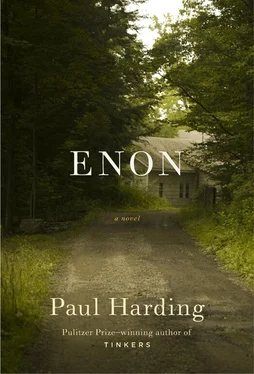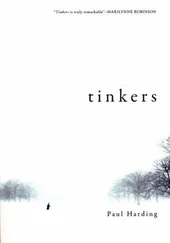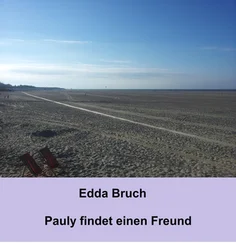Paul Harding - Enon
Здесь есть возможность читать онлайн «Paul Harding - Enon» весь текст электронной книги совершенно бесплатно (целиком полную версию без сокращений). В некоторых случаях можно слушать аудио, скачать через торрент в формате fb2 и присутствует краткое содержание. Жанр: Современная проза, на английском языке. Описание произведения, (предисловие) а так же отзывы посетителей доступны на портале библиотеки ЛибКат.
- Название:Enon
- Автор:
- Жанр:
- Год:неизвестен
- ISBN:нет данных
- Рейтинг книги:3 / 5. Голосов: 1
-
Избранное:Добавить в избранное
- Отзывы:
-
Ваша оценка:
- 60
- 1
- 2
- 3
- 4
- 5
Enon: краткое содержание, описание и аннотация
Предлагаем к чтению аннотацию, описание, краткое содержание или предисловие (зависит от того, что написал сам автор книги «Enon»). Если вы не нашли необходимую информацию о книге — напишите в комментариях, мы постараемся отыскать её.
Powerful, brilliantly written, and deeply moving Paul Harding has, in Enon, written a worthy successor to Tinkers, a debut which John Freeman on NPR called "a masterpiece." Drawn always to the rich landscape of his character's inner lives, here, through the first person narrative of Charlie Crosby (grandson to George Crosby of Tinkers), Harding creates a devastating portrait of a father trying desperately to come to terms with family loss.
Enon — читать онлайн бесплатно полную книгу (весь текст) целиком
Ниже представлен текст книги, разбитый по страницам. Система сохранения места последней прочитанной страницы, позволяет с удобством читать онлайн бесплатно книгу «Enon», без необходимости каждый раз заново искать на чём Вы остановились. Поставьте закладку, и сможете в любой момент перейти на страницу, на которой закончили чтение.
Интервал:
Закладка:
Mrs. Wallace and her husband were a prosperous, retired couple, the parents of five prosperous grown children, three of whom, according to the article, were lawyers, like their father, the other two consultants. The children lived variously in Manhattan; Washington, D.C.; London; and on Beacon Hill in Boston.
I had tended the Wallaces’ yard for a summer, when Kate must have been eight or nine. Mrs. Wallace was then already fully wrapped in a serene counterpane of Valium more or less every waking moment. Her youngest child, a daughter named Libby, had moved into a townhouse Mrs. Wallace and her husband had purchased for her in Georgetown. I knew this only because, even though my impression was that the family had never been what I would have called close, Mrs. Wallace had had some sense that the family had always been so, and that the departure of the last of the children she had borne marked the end of something vital and essential in her life, and she managed to convey this indirectly during one of a handful of lectures about my poor landscaping skills, which culminated in her firing me at the end of the summer, before the fall leaf cleanup season (right when I stood to make good money from her, since her property consisted of eight acres, on which there grew twenty-six mature maple trees, a nice mix of sugars, which dropped their leaves early, and silvers, which always held their leaves anywhere from a week to three weeks later than the sugars and always meant a second cleanup). On the afternoon when I realized she was on some kind of sedative, she was chastising me for not mowing the lawn short enough.
“I don’t like my lawn to look like a shag carpet, Mr. Crosby,” she said. “For reasons that I should think you might find obvious.” She had the plodding humorlessness of someone who got what she wanted through sheer will rather than intelligence or grace. I scarcely ever saw her smile or heard her laugh, and when she did laugh it had a tone of mirthless superiority. She was dressed in what I always called to myself her yard-work clothes, which consisted of an immaculate white, short-sleeved sort of oxford shirt tucked into a pressed pair of high-waisted women’s khakis that ended above her ankles and a pair of old, scuffed brown leather loafers. She was a slight, trim woman and had let her hair go white. She also wore a pair of white gardening gloves and as she lectured me, she had one hand on a hip; in the other she held a fistful of zinnias she had tugged up from one flower bed or another, surely to the dismay of Suki, a Japanese guy who took care of a bunch of gardens in Enon at the time, including Mrs. Wallace’s. (It was said that Suki had been a fisherman in Japan but had jumped ship during World War II, somehow ending up in Stonepoint, and that he lived in an old tackle shed next to a pier under the Stonepoint Bridge. I don’t know if any of that was true. He spoke no English, although he must have understood some, and absolutely refused to have anything to do with us landscapers. The most I ever managed to get out of him once, when I needed to know if I could spread fertilizer on a patch of lawn I’d reseeded near some especially delicate-looking flowers, was “Fucking Yankee !” and I left it at that, because that made me like him.)
I said, “Certainly, Mrs. Wallace. I usually keep the grass a bit longer this time of the summer, because it’s so hot and there’s so little rain and the grass can end up burning out.”
Mrs. Wallace stared directly into my eyes and hesitated a moment before answering me, and that was when I realized she was on some kind of prescription that, as the guys in the crew used to say, smoothed out the choke.
“I had the idea that it was your job , Mr. Crosby, both to keep the grass short and to make sure it did not burn out, as you put it.”
The article in The Daily Bread had quoted Mrs. Wallace as saying that it was going to be hard for her to tend properly to her flowers because her husband was coming home from the hospital. If she still used Valium, and if her husband had had surgery, which no doubt meant a prescription for painkillers, theirs would be a likely house to visit. And even though it had been several years since I’d tended their lawn, I knew the property and I knew that they did not have any sort of a security system, that that was something in which they’d have taken pride, since their home and their village were places where one did not need such things. This was a sentiment shared by many of Enon’s older citizens. And it was true that no public transportation ran to or through Enon, nor any major roads (and there were no signs on those roads indicating Enon’s existence), and that no one from outside the village — and, in fact, not many inside it — would even be aware of homes like the Wallaces’, which were not visible from the street nor indicated by mailboxes. The way to their home was a seemingly untended dirt road at an opening in the woods along a country lane off Main Street. I realized, too, that I could approach their home from the back if I went through the woods that began past Wild Man’s Meadow.
I set out at midnight. It was Thursday. I dressed in black jeans and a dark blue hooded sweatshirt and wore work boots. I brought a pair of orange rubber dishwashing gloves so there wouldn’t be any fingerprints, a nearly corroded can of 3-in-One oil from one of my grandfather’s old toolboxes, for oiling hinges so the doors wouldn’t squeak, and a roll of duct tape for taping up deadlatches. The night was damp and chilly, but mild for April. Pools of ground fog had formed in the depressions in Wild Man’s Meadow, and mist flowed across the road between the field and the swamp. There was salt in the pith of the wind. I climbed over the stone wall bordering the field along the road and walked abreast of it, toward Cherry Street. The wall and the branches of the white pines planted at intervals of fifty or so feet along its entire length gave me cover in case any cars passed. Only one vehicle — a truck — drove by, very slowly, and in the fog its headlights made it seem like a submarine probing along the floor of a black ocean trench, searching for signs of life at such unsettling and inhospitable depths. For a moment, I was a frowning fish with a mouthful of serrated teeth, straining for a better look at the metal animal pushing along behind its starry lamps.
When I reached the back of the meadow, I cut into the woods at the Tucker family burial plot, which consisted of four headstones enclosed in an iron-railed fence. The woods felt strange and oddly open. I kept having the sensation of being approached from behind. I wanted to turn back, but I felt ill from the lack of drugs and so I continued picking my way through the dark.
When I reached the edge of the woods, at the border of the Wallaces’ property, I knelt for a moment, steadied my breathing, then put on the rubber gloves and scuttled across the lawn. A mudroom off the kitchen led to the inner door. I oiled the door’s hinges and handle, opened it, and stepped inside. The room smelled like clay and cold mud and sweet, damp newspapers. There was a shallow bench and a coat stand, from which hung a flannel shirt worn through at the elbows. Three kitchen trash barrels were lined along the wall opposite the bench, labeled, GLASS, PLASTIC, and CANS. A plastic tub stacked with copies of The Wall Street Journal and the Enon Daily Bread stood next to the barrels. Just inside the threshold was an iron doorstop shaped like a bullfrog wearing a footman’s coat and black shoes with white spats. He had one arm tucked behind his back and the other extended in front of him. I picked the frog up and propped the outer door open with him.
My head and hands and legs buzzed and trembled worse than ever, and I was nauseated enough that I worried I might begin retching. I could barely concentrate on anything other than the need to stuff my mouth with handfuls of pills and I nearly sobbed out loud at being so strung out, sweating and scuffling at some poor, rich old couple’s back door. I still had enough sense, though, to know that I fully deserved being brained with a poker or perforated by buckshot. In fact, the only way I’d gotten up the nerve to commit the crime in the first place was to have half-convinced myself that I would be caught and that would be justice, and that getting away with the drugs would be an absurd, almost malevolent turn of events.
Читать дальшеИнтервал:
Закладка:
Похожие книги на «Enon»
Представляем Вашему вниманию похожие книги на «Enon» списком для выбора. Мы отобрали схожую по названию и смыслу литературу в надежде предоставить читателям больше вариантов отыскать новые, интересные, ещё непрочитанные произведения.
Обсуждение, отзывы о книге «Enon» и просто собственные мнения читателей. Оставьте ваши комментарии, напишите, что Вы думаете о произведении, его смысле или главных героях. Укажите что конкретно понравилось, а что нет, и почему Вы так считаете.












